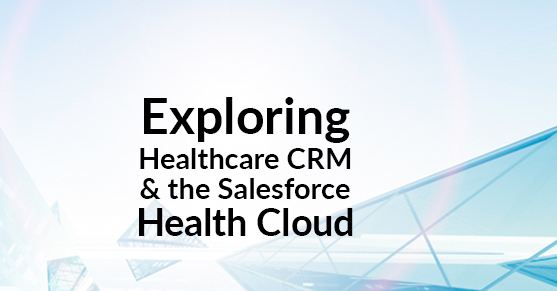The expansion of technology into the healthcare field has lent itself to stronger patient-to-provider relationships. During a time when accessing patient information couldn’t be more important, having the right technology to integrate medical information across providers is vital. One of the best ways healthcare organizations are fixing the disconnect is through implementing Healthcare Customer Relationship Management (HCRM) systems.
In the spectrum of CRM technology, HCRM is relatively new and its effects on the industry have been seen in a variety of ways. From patient care and documentation to hospital resource allocation and healthcare professional reports, HCRM is revolutionizing the way care is given in the modern age. Let’s take a look at the intricacies and exact offerings of HCRM systems, and how the Salesforce Health Cloud takes them to the next level.
What is Healthcare CRM?
An HCRM system is a CRM specifically designed to enable healthcare organizations to leverage the power of data insight for understanding patient behaviors and habits. HCRMs integrate patient data in multiple areas — demographics, clinicals, finances, call center information, insurance provider credentialing, etc. — to attract more patients, enhance their engagement, and improve the overall patient experience.
In the same way that typical CRMs build holistic customer profiles, HCRM aims to provide organizations with a 360-degree view of each patient or consumer. This information amplifies the ability to design robust communication strategies for customized outreach, whether it be in the form of personalized messaging, follow-up notes, patient referrals, and the numerous other touchpoints between the practitioner and patient/consumer. For example, by integrating an HCRM with Electronic Medical Records (EMR), organizations can quickly see pre-existing and past visits to more accurately diagnose patients, determine appropriate treatments and medications, and quickly schedule follow-up appointments.
With the right system and a data-driven strategy, HCRM initiates helpful interactions with healthcare organizations, which in turn helps develop genuine relationships between patients and health workers. Given the distancing required for doctors to do their job objectively, doctor-patient relationships are difficult to navigate; HCRMs help humanize the relationship while still maintaining the parameters.
What is Salesforce Health Cloud (SHC)?
Answering the call for HCRM in exceptional fashion has been Salesforce with their Healthcare Cloud, which was released in 2015 in partnership with several healthcare providers, medical device/software companies, and caregiver organizations, including Accenture, Deloitte, Persistent, Philips, and PwC.
Through one-to-one relationship management, SHC offers a secure environment for medical professionals and caregivers to access encompassing patient information to deliver unparalleled service. The product also includes Private Communities, which gives patients access to special care packages, health providers, health plans, insurance, and more through an internet portal or mobile application. With all the necessary data connected and integrated, patient preference drives every engagement so providers can deliver outstanding services and patients can get the medical attention they need. It’s a win-win platform.
From healthcare providers to pharmaceutical companies and medical device manufacturers and distributors, SHC has set the foundation for many organizations to improve every point of contact between healthcare and patients. Can healthcare organizations use Salesforce without the Health Cloud? Of course, they can! They’ll still get the same Salesforce functionality, but with the Health Cloud Lightning Console, users can hit the ground running with prebuilt objects and fields to meet their immediate needs.
Leveraging HCRM at Your Organization
Right now, having the necessary tools to keep up the fight against COVID-19 is vital, and having an HCRM is needed now more than ever. Treating patients with exact information can decide the fate of many, which is why HCRM systems are becoming an essential part of many healthcare provider’s toolkits.
For more information on the state of Healthcare CRM technology or the Salesforce Health Cloud Lightning Console, feel free to reach out to us via the comments below or contact us here.

